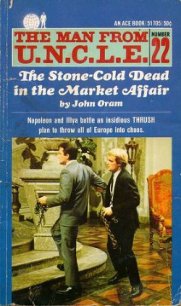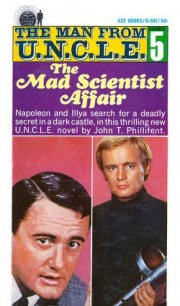The Copenhagen Affair - Oram John (лучшие бесплатные книги .txt) 📗
“The guard,” Illya whispered. “I’ll take him. You two split up and plant your charges along the fence.”
He got down on his belly and began to wriggle over the frozen grass like a snake.
The guard never lived to finish his quiet smoke. A karate chop across the back of his neck felled him before he could utter a sound. Illya dragged the body a few yards away from the building and then swiftly went about the business of setting his charges.
At exactly three minutes past six Solo opened the shutter. He had put on dark glasses to protect himself against the intense glare of the lights in the workshop.
The giant saucer was still on its ramp. The hatch in the lower disc was open, but the ladder had gone. The tractor was standing by, empty. The driver was leaning against its side, chatting with four workmen clad in white overalls. Another group of men stood by the generator. The armored cables had been removed.
Neither Garbridge nor Sonder was in evidence. Solo wondered whether they were inside the saucer. That was a chance he had to take.
At six-five he clipped a respirator over his nose and mouth, slid the rubber hose through the shutter opening and pushed down the lever on the top of the cylinder.
A jet of gas under high pressure screamed into the workshop. The men below looked up, startled. Then their faces cracked in idiotic grins and they began to laugh. It was not natural laughter; the sound had a hysterical quality that after a second became terrifying. They could neither stop nor control it. Their limbs began to twitch. They ran about aimlessly, without direction, as if blind, all the time cackling and hooting with insane mirth.
Sonder and two other men ran from the interior of the saucer and stopped by the hatch, staring incredulously. Then the gas caught them.
One by one, the men sank exhausted to the floor of the workshop and lay there, arms and limbs jerking like the limbs of marionettes. After awhile they were still.
“Sleep tight, babies,” Solo said. He opened the shutter to its fullest extent, wriggled through with some difficulty, and dropped into the room.
At exactly five minutes after six Illya pressed the plunger. Sound smashed at his ears, there was a sheet of flame, and the blockhouse disintegrated like a bursting orange. Debris spattered down, a jagged fragment of concrete missing his head only by inches. Answering explosions on either side told him that Viggo and Knud had taken care of the electrified fence.
He jumped to his feet and with his gun ready made for the mine entrance.
A searchlight beam stabbed the darkness and came sweeping toward him. A machine-gun chattered as he dropped flat. Thrown-up, frozen earth hit him painfully in the face. The unseen gunner was uncomfortably accurate in his snap-shooting.
He heard Viggo’s heavy Mauser go into action. The light went out abruptly.
Illya got up and ran on. The machine-gun was still firing blindly, swinging in a wide arc. He could see from the stabbing orange tongue of flame that it was positioned just to left of the mine’s mouth. He pulled a grenade from his haversack, extracted the pin as he ran, and threw. The machine-gunner lost interest in the proceedings.
There was no more opposition.
When the three men got to the entrance of the mine they found Solo waiting. He said, smiling, “Nice work. True Danish efficiency.”
Illya asked, “What about Garbridge and Sonder?”
“Sonder’s dead. His dancing was too energetic. He fell off the rim of the saucer and broke his neck.”
“And Garbridge?”
“Not a sign of him.”
“Ah, well! You can’t win ’em all. Let’s tell Karen the glad news.”
Illya brought the transmitter from inside his tunic, adjusted the dial and called, “Come in, Angel.”
There was no reply. “Odd,” he said, frowning.
“Maybe your transmitter isn’t working,” Solo said. “Try mine.”
Illya called again, more urgently: “Angel, come in.”
Only the crackle of static answered.
Solo said, “Something’s happened. Let’s go.”
They pounded at top speed back to where they had left the truck.
It was gone.
CHAPTER TEN
DESPITE HER HEAVY sweaters and duffel coat Karen was suffering. Her face was becoming a frozen mask and no amount of stamping and pacing would restore the circulation in her feet. Finally she climbed into the driving seat of the truck, putting her Walther on the seat beside her. It would be just as easy to keep a watch on the road from there as out in the biting wind, she told herself mendaciously.
For greater comfort she wound up the side windows. That was her big mistake. The comparative warmth was too much for her. Insidiously, imperceptibly, she became drowsy. Her eyelids dropped. Even the sound of the explosions at the mine failed to rouse her completely.
Suddenly there came a blast of cold air as the door was yanked open. A flashlight shone into her eyes, blinding her, and a gun barrel jabbed painfully into her ribs.
Garbridge’s voice came viciously: “Move over and don’t try anything. Keep your hands in your lap.”
The flashlight beam swung over the seat, came to rest on the Walther. Garbridge said, “Give that to me—butt first. And don’t attempt heroics.”
There was no choice. She handed the weapon to him.
“Now move!”
He got behind the wheel, switched on and let in the clutch. The car bounced forward.
“Who the devil are you, and what do you think you’re doing?” Karen demanded.
He laughed humorlessly. His foot was hard down on the accelerator and his eyes fixed on the road ahead. He said, “You know perfectly well who I am, and I know exactly what I’m doing. If you sit quietly, like a good girl, you will have a pleasant ride. If you don’t, I won’t hesitate to kill you. Your friends have caused me enough trouble tonight.”
“Where are you taking me?”
“That,” he said, “you will find out in due course. Would you like a cigarette? No, of course, you smoke cigars.”
“You seem to know a lot about my habits.”
“It is my business to know about the opposition.”
Karen said: “I would like a cigarette.”
“You’ll find them in my side pocket nearest to you. Matches, too. But again, my dear, don’t try anything.”
She found the pack. The cigarettes were imported English. She drew the smoke into her lungs gracefully.
He said, “Feeling better? Keep the pack; I have plenty.”
Karen laughed. “You seem to be taking things pretty calmly, considering that your factory has gone sky-high.”
“A temporary setback only. I hope that you will restore the balance.”
“How?” she asked, surprised. He did not answer.
They were on Highway 10 now, and traveling rapidly toward Horsens. Karen decided that as soon as they got on to Sonderbrogade or one of the other main streets she would scream and risk the consequences. Garbridge would hardly be likely to shoot her quite so publicly.
Her hopes were disappointed. On the outskirts of the town Garbridge swung the truck down a side road toward the fjord and turned into the drive leading to a large white house. As they went through the gate, Karen saw an illuminated board reading: SOLLYS MATERNITY HOME.
She said, “No wonder we drew a blank here. Not even your best friend—if you have any—would connect you with tiny babies.’,
He dropped the truck in front of the house, and said to the uniformed man who came running down the steps, “Take this thing and lose it. Run it into the fjord.”
He leaned over and opened the door on Karen’s side. “Get out. And don’t forget I’m right behind you with the gun.”
She obeyed. Garbridge gestured with the Luger. “Up the steps, please. Quickly.”



![[Magazine 1966-12] - The Goliath Affair - Jakes John (библиотека электронных книг TXT) 📗](/uploads/posts/books/56867/56867.jpg)
